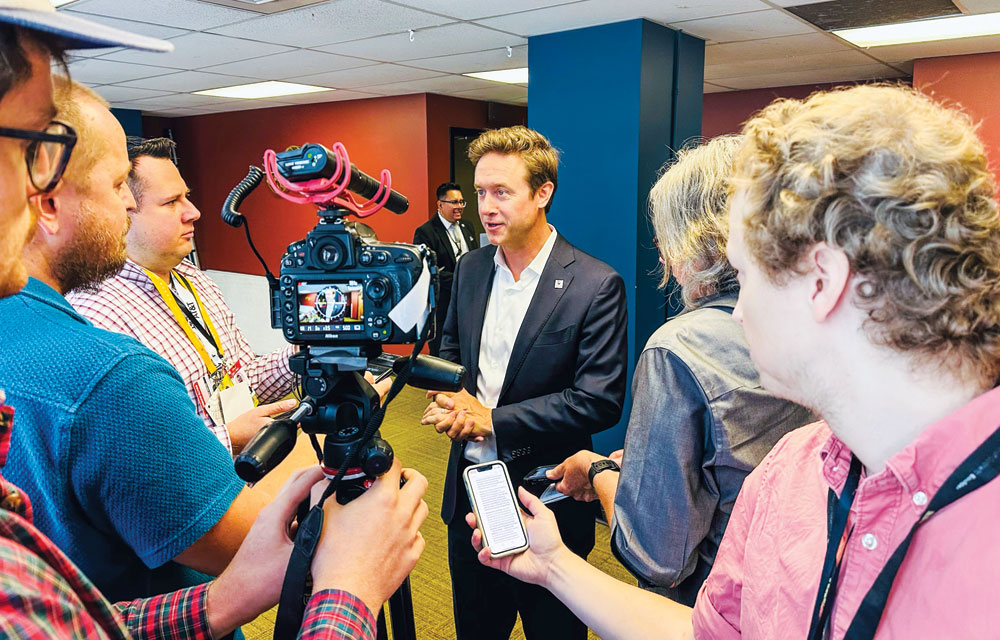
Mayor Mike Johnston speaks with reporters following his “State of the City” speech at the Paramount Theater in downtown Denver on July 22. Front Porch photo by Christie Gosch
“Our work is not done, but our progress is dramatic”
One year into his administration, Mayor Mike Johnston says he is proud of the work that has been accomplished, but he admits he’s only just getting started. “Our work is not done, but our progress is dramatic,” he told a crowd of several hundred people during his first “State of the City” speech in late July.

One year after his inauguration, shown above, Mayor Mike Johnston speaks about his first year in office and his future plans. Front Porch file photo by Christie Gosch
He pointed to his homelessness program and his migrant response as the main areas of success. And he called on the voters of Denver to help him this fall to continue to make Denver “the capital of the New West” where people “believe in each other, lean on each other, and they fight for each other, fortified by the deep belief that all our problems are solvable.”
His biggest achievement has been an initiative that moved 1,600 people off the streets and into transitional or permanent housing. According to city records, 84 percent of those people remain off the streets. But the initiative has been criticized by many residents of northeast Denver because most of the people were put in transitional housing units in Council District 8. The mayor had promised that every district would bear part of the burden, but so far, six districts still do not have any transitional housing sites. When asked by Front Porch about the discrepancy, Johnston said that his vision is a “continuum” in which all parts of the city will ultimately have a combination of shelters, transitional units, and low-income housing. “We view it as a balancing act.”
District 8 Councilwoman Shontel Lewis says that while she wishes that the transitional facilities could have been more equitably spread across the city, she needs to give the mayor credit. “I really appreciate that he’s willing to do really difficult things and innovative things in order to get folks into housing.”
Mike Dino, political analyst and former senior aide to Mayor Wellington Webb, agrees. “As it relates to addressing homelessness, he set a new bar.” But Dino says it comes at a cost. “It’s an expensive proposition to do what he’s doing. His predecessors didn’t quite want to put that much money into it, but he has done it. Now the question is, ‘Is it sustainable?’”

Mayor Johnston waves to families at the annual Park Hill Parade, the largest Independence Day march in Denver. Photo courtesy of the Mayor’s Office
Johnston said another huge achievement was the way Denver rose to the challenge of helping thousands of migrants who arrived in the city, giving credit not only to his administration, but also to individuals who have volunteered in countless ways. “We rolled up our sleeves and believed even this problem was solvable. We put thousands of people through free legal clinics to get work authorization, we moved thousands of people into housing, and we launched the country’s first Asylum-Seekers Program that helps our newcomers get what they need most: a job.”
Looking to the year ahead, Johnston said he needs the help of voters to pass a ballot initiative to fund the construction of affordable housing units across the city. “This measure, funded by a half penny sales tax, would only cost Denver families about $2 a week, but it would put us on the path to bring on the 45,000 units of affordable housing we need to fill our entire gap of affordable housing over the next 10 years.”
Councilwoman Lewis says she is going to work hard to help pass that ballot initiative because it will foster a new approach. “Historically, we’ve done low-income housing wrong and in a way that concentrates poverty. I’m really excited to be able to bring multi-generational housing to District 8 and throughout the entire city.”
Dino says the Mayor’s affordable housing initiative will join a crowded ballot that will ask residents to spend more money on hospitals, public schools, and transportation, and he wonders whether voters will be in the mood to spend money on this. He notes that Johnston “has the energy and personality to promote this, but it will be a big judgment on him,” says Dino. “In a lot of ways, this will be a referendum on him and his policies.”
In addition to the affordable housing initiative, Johnston says in the coming year he will increase police patrols in neighborhoods and redouble efforts to revitalize downtown Denver. He also told Front Porch that northeast Denver residents can expect an announcement about the future of the shuttered Park Hill Golf Course property. “We’re optimistic that we’ll get to a solution that the community will be excited about. We’ve been at this for several months. It’s complicated, but we’re pushing aggressively,” says Johnston.
He and his wife Courtney are also launching a program called Give5 Mile High to encourage all residents to volunteer five hours a month on a community service project. Give5 Mile High will hold community service events on the third Saturday of every month. The kickoff project on August 17 will tackle cleanup projects at more than a dozen public schools throughout the city. For more information, visit denvergov.org/give5milehigh.




0 Comments